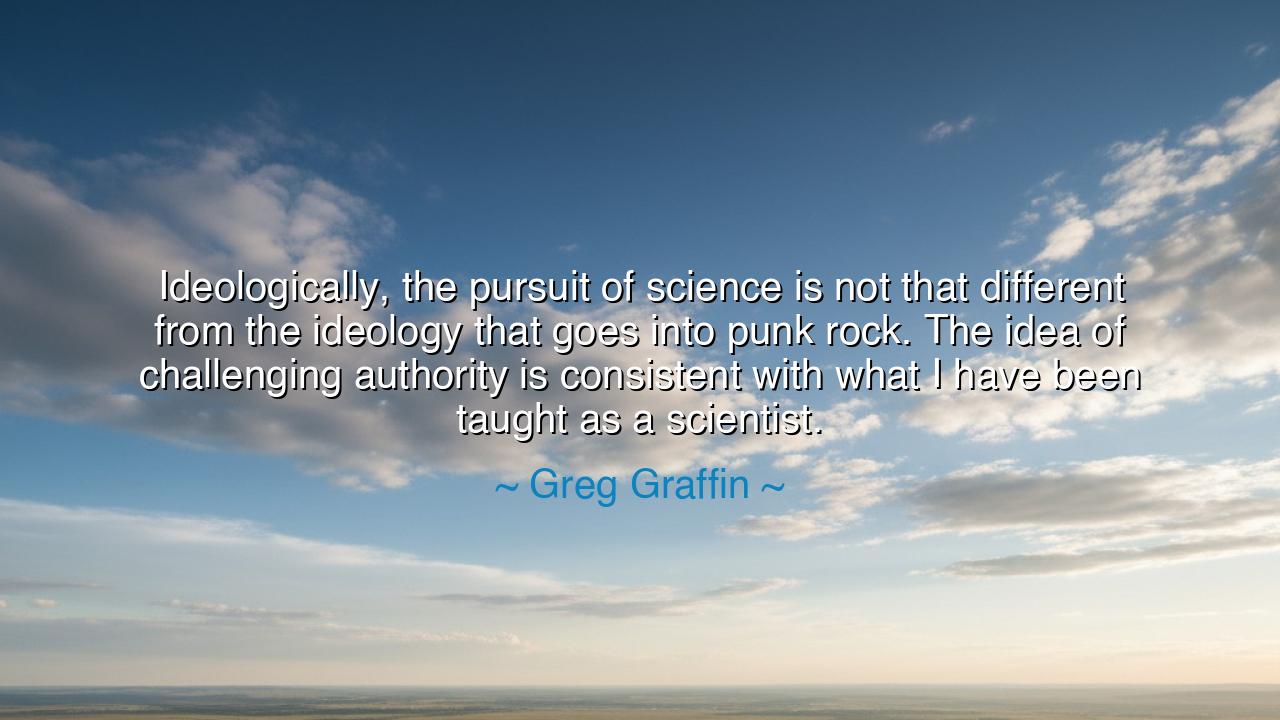
Ideologically, the pursuit of science is not that different from
Ideologically, the pursuit of science is not that different from the ideology that goes into punk rock. The idea of challenging authority is consistent with what I have been taught as a scientist.






Listen closely, O children of the future, for the words of Greg Graffin, a man who stands at the crossroads of science and rebellion, have much to teach us. He said: "Ideologically, the pursuit of science is not that different from the ideology that goes into punk rock. The idea of challenging authority is consistent with what I have been taught as a scientist." At first glance, one might see science and punk rock as worlds apart—one rooted in logic and discovery, the other in rebellion and defiance. But Graffin, with his keen insight, sees a deeper connection: both share a fundamental ideology—the courage to challenge authority and question the status quo.
In the ancient world, there was no greater form of rebellion than the act of questioning the gods or the society that upheld the laws of the land. Socrates, that great philosopher, was not merely a seeker of knowledge; he was a challenger of authority. His method of questioning—his relentless pursuit of truth—brought him into direct conflict with the established order of Athens. He did not accept things as they were but sought to uncover the deeper truths beneath the surface, challenging the beliefs of the powerful in favor of the truth. Like Socrates, Graffin sees science not just as a pursuit of knowledge, but as an act of rebellion against the falsehoods and ignorance that authority often tries to impose upon the people.
The spirit of punk rock—that vibrant, rebellious culture born in the late 20th century—shares much with science. At its core, punk rock is not just about loud music or a certain style; it is a rejection of the norms, the rules, and the established authority that often seeks to define people’s lives. The punk ethos is about individuality, freedom, and the willingness to question everything—be it the political establishment, social norms, or the expectations of society. Similarly, science challenges what is known, pushes against the boundaries of understanding, and constantly asks, "Why?" What is true? What is real? It does not accept the status quo but works relentlessly to uncover the truths that lie hidden beneath the surface.
Consider, O wise ones, the story of Galileo Galilei, a man whose pursuit of scientific truth was a direct challenge to the authority of the Catholic Church. When Galileo declared that the Earth orbited the Sun, his findings directly contradicted the geocentric model that the Church held as absolute truth. He was not simply performing experiments—he was challenging the authority of one of the most powerful institutions of his time. Galileo’s defiance was not born from a desire to rebel for rebellion’s sake, but from a deep and unwavering commitment to the truth—to the pursuit of knowledge, no matter the cost. Like the punk rockers who defy convention, Galileo faced exile, scorn, and punishment, but he did not relent in his pursuit of truth. This story echoes Graffin’s insight: science, like punk rock, is an act of challenging the powers that be in the name of a deeper, more honest understanding.
The lesson here, O children of the future, is clear: The pursuit of truth—whether through science or art—requires the courage to challenge authority. It is not enough to accept things as they are, for it is only through questioning and revolutionizing the established order that we can uncover what is real and true. Science does not merely accept the answers given to it by the powers that be—it questions, tests, and probes every accepted idea until it can be proven or disproven. In the same way, punk rock questions the systems that try to control or limit individual expression, demanding that people think for themselves, break free from constraints, and live authentically.
In your own lives, remember that the act of questioning authority is not an act of destruction but of creation. Do not be afraid to challenge the norms, to question what you are told is true, and to seek your own understanding of the world. Be courageous like Galileo, like Socrates, and like the punk rockers who dared to defy convention. True wisdom is found not in conformity, but in freedom of thought—the ability to think critically, challenge assumptions, and forge your own path.
Rise, O seekers of wisdom, and take up the mantle of the rebellious spirit that lives in the pursuit of truth. Do not accept the world as it is—but seek to understand it for what it could be. In your quest for knowledge, whether in science, art, or life, be willing to challenge and question, for it is only through this that you will discover the truths that have yet to be revealed. The world needs thinkers who are unafraid to stand up and say, "I will not accept the status quo. I will find my own truth." Through this courage and rebellion, you will shape a future that is free and true.






AAdministratorAdministrator
Welcome, honored guests. Please leave a comment, we will respond soon